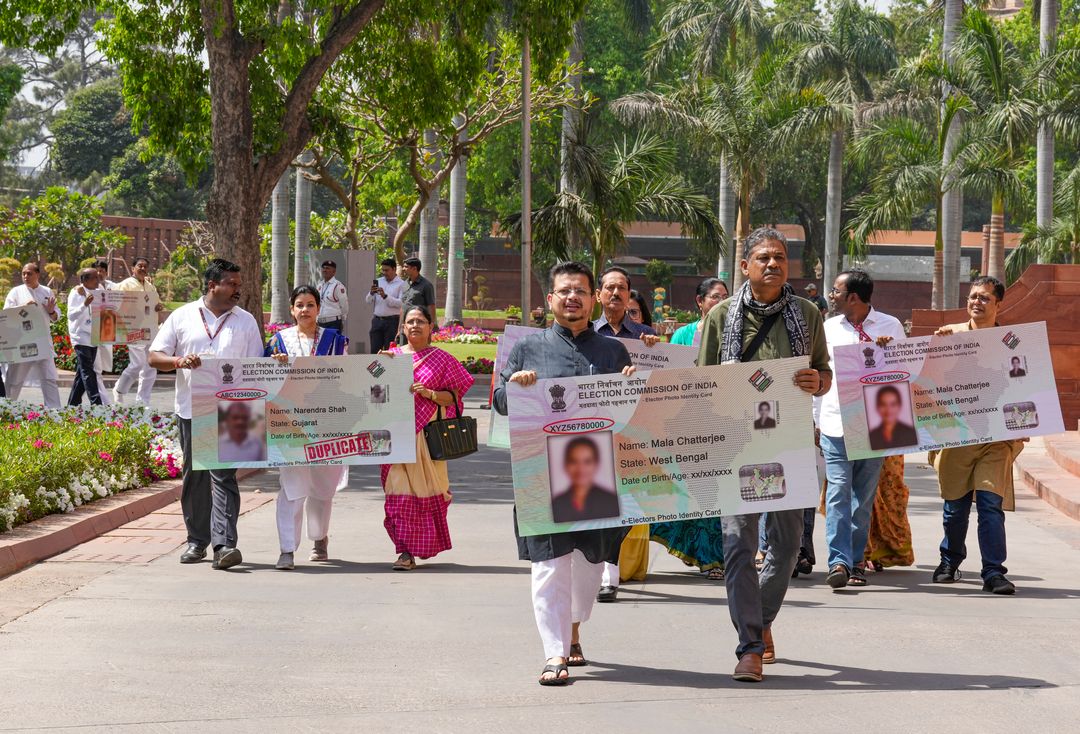New Delhi, March 4: The Trinamool Congress (TMC) on Tuesday intensified its attack on the Election Commission of India (ECI), dismissing the Commission's clarification regarding duplicate voter ID numbers as a "cover-up." The party cited the poll panel's own guidelines to assert that issuing two cards with identical EPIC numbers is inherently impossible.
This controversy began on Monday when the TMC accused the Election Commission of a "scam" in issuing duplicate voter ID numbers. The party had initially given a 24-hour deadline to the Commission to acknowledge the alleged "mistake."
In his statement, Gokhale alleged:
He clarified further:
He explained:
Gokhale also questioned the neutrality of the Election Commission, pointing out the recent changes in the appointment process for Election Commissioners, now decided by a panel dominated by the Prime Minister and Home Minister Amit Shah.
He remarked:
The Election Commission previously clarified that duplicate numbers emerged due to a decentralized and manual system in place before migrating all voter databases to the ERONET (Electoral Roll Management) platform.
This controversy began on Monday when the TMC accused the Election Commission of a "scam" in issuing duplicate voter ID numbers. The party had initially given a 24-hour deadline to the Commission to acknowledge the alleged "mistake."
Saket Gokhale Highlights Guidelines to Counter EC Claims
On Tuesday, TMC Rajya Sabha MP Saket Gokhale took to social media platform X (formerly Twitter) to challenge the Commission’s response directly. He shared excerpts from the "Handbook For Electoral Registration Officers", stating that the clarification provided by the ECI contradicts its established procedures.In his statement, Gokhale alleged:
Gokhale argued that according to ECI guidelines, EPIC (Electronic Electoral Photo Identity Card) numbers must always be unique, incorporating a Functional Unique Serial Number (FUSN)—a three-letter alphanumeric code specific to each Assembly constituency. This, he pointed out, makes duplication impossible, even within the same state."Yesterday, the All India Trinamool Congress gave the Election Commission of India 24 hours to admit and accept their blunder on the duplicate voter ID fraud issue. Clearly, the ECI, which has been exposed, wants to brazen it out."
Contradiction Highlighted by TMC
The Election Commission had earlier explained that the duplication arose because certain states had used identical alphanumeric sequences. However, Gokhale strongly refuted this claim, highlighting guidelines from the ECI handbook that explicitly outline how each constituency is assigned a unique code.He clarified further:
"It is impossible for voters in two different Assembly constituencies—even within the same state—to share the same first three letters on their EPIC. How then have voters in West Bengal ended up with EPIC numbers identical to those of random individuals in Haryana, Gujarat, and other states?"
Allegations of Potential Voter Suppression
Gokhale further highlighted serious implications, emphasizing that duplicate EPIC numbers could cause significant confusion on polling day, potentially leading to voters being turned away due to photo mismatches. He asserted this situation would disproportionately affect voters in states or constituencies not favorable to the BJP.He explained:
"In photo electoral rolls, the elector is linked to their photo by the EPIC number. A mismatch would result in voters being denied their fundamental right to vote, clearly an attempt to suppress votes likely to go against the BJP."
Calls for Transparent Investigation
The TMC MP demanded that the Election Commission come clean about how many EPIC cards currently bear duplicate numbers. He underscored the necessity of an impartial investigation into this matter, given the seriousness of potential voter disenfranchisement.Gokhale also questioned the neutrality of the Election Commission, pointing out the recent changes in the appointment process for Election Commissioners, now decided by a panel dominated by the Prime Minister and Home Minister Amit Shah.
He remarked:
"If the ECI is compromised on behalf of the BJP, there can be zero possibility of free and fair elections. The Commission must disclose transparently how many EPIC cards share duplicate numbers."
Parliamentary Debate Anticipated
Sources indicate the TMC plans to escalate this issue further in the upcoming session of Parliament. The party is reportedly coordinating with other INDIA bloc allies who have also raised concerns about voter list irregularities in their respective states.The Election Commission previously clarified that duplicate numbers emerged due to a decentralized and manual system in place before migrating all voter databases to the ERONET (Electoral Roll Management) platform.

